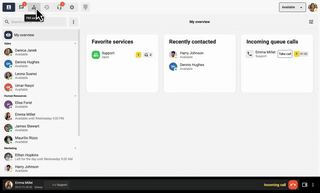The number of phone scams is growing as fraudsters become more sophisticated and can affect anyone who is not careful. What should you do to protect yourself? We list the key elements to consider.
You receive a call from a person who says they are calling from your bank. The person says that there has been some kind of suspicious unexpected activity on your account and that you need to take action. The person is calm and friendly and seems well-informed and you get the feeling that there is an urgency to act and you are naturally stressed. The person asks you to log in with BankID to take it further, what do you do?
Vishing, smishing and phishing
Unfortunately, there are many ways for fraudsters to access sensitive data today, which has led to the introduction of new concepts. Phishing or phishing means that a fraudster lures sensitive information via the internet. It is called smishing if it is done via text message, and vishing if it is a scam over the phone.
Whatever the type of fraud, it can be costly if the fraudster gets hold of a large amount of your assets. Nor can the shame imposed on the victim be ignored. Nobody wants to be scammed or feel stupid, but it’s important to remember that anyone can be affected as scammers become increasingly adept at communicating convincingly.
How the number of phone scams has increased
In 2020, the number of authority fraud cases reported to the police increased from 3 600 to 4 660, i.e. where someone makes contact and pretends to work, for example, at a bank or as a police officer. Telephone fraud, or vishing as it is also known, involves someone calling a person to trick them into giving them access to their bank account or login details to access sensitive information.
In 2020, fraudsters accessed almost 160 million SEK through viewing in Sweden alone. The increasing trend of phone fraud is now not only seen among older people, but also among a younger target group.
Our top 3 tips to protect yourself against phone scams
If you have an accident, it is important to contact your bank as soon as possible if you suspect you have been defrauded. You should also always report the incident to the police.
In the hope of preventing the risk of being affected (or of it happening again), we recommend that you get into the habit of following these three tips:
- Never log in with BankID or your bank card at the request of someone else.
- Never give out your personal details or passwords to anyone.
- Adjust outgoing calls to gray-listed destinations.
Grey-listed destinations
Gray-listed destinations are a list of countries where there is telephone fraud over the phone with very high per-minute costs. In general, there is limited telephone traffic between the Nordic countries and these countries. If you are a customer of ours, you have a preset function where these country numbers are automatically blocked for outgoing calls.
We continuously update this list to minimize the risk of you being scammed. However, if you receive a missed call from an international number you don’t recognize, we advise you not to call back!
How to remove gray-listed destinations
In Telavox Admin it is possible to remove gray listed destinations completely, block certain numbers or add exceptions for selected countries that you have frequent contact with. To make changes, go to Telavox Admin > Users > Call routing.
If you want to access a specific list of the current gray-listed destinations, please contact your Customer Success Manager, partner or reseller.

